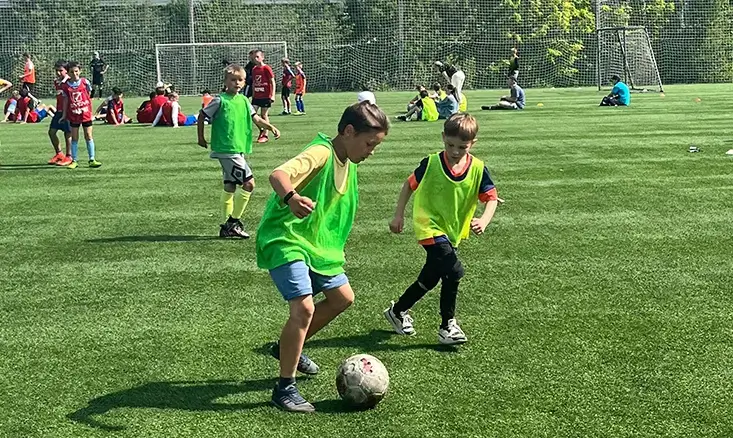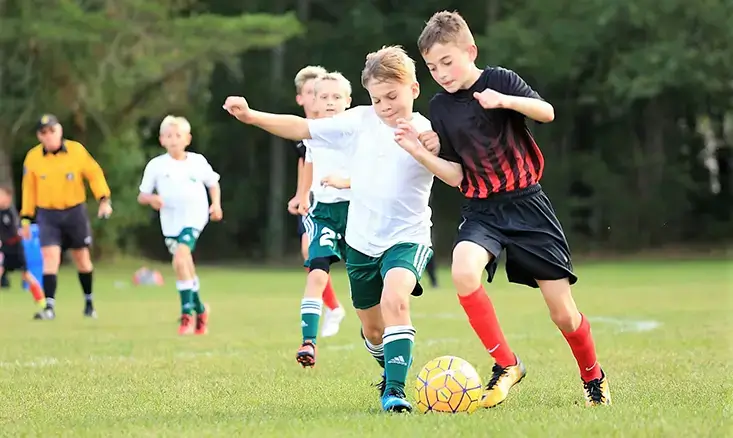CRFC BLOGS
LATEST BLOGS & NEWSLETTERS
How to Avoid Burnout in Youth Soccer Players
Youth soccer is an excellent way for kids to stay active, learn teamwork, and enjoy competition. However, with long hours of practice, frequent games, and the pressure to excel, many young players experience burnout. Burnout can diminish their love for the game, affect their health, and even lead to quitting the sport entirely.
What Is Burnout in Youth Soccer?
Burnout happens when young players feel physically and mentally exhausted due to excessive training and high-pressure expectations. It often leads to losing interest in the game, irritability, and even injuries. Preventing burnout involves balancing training schedules with rest, creating a positive environment, and focusing on the player’s well-being.
Why Preventing Burnout Is Important?
Burnout doesn’t just impact a player’s performance—it affects their happiness and health. When young players are pushed too hard, they can lose motivation and stop enjoying soccer. By understanding and addressing the signs of burnout early, parents and coaches can help young players maintain their love for the game while staying mentally and physically healthy.
Strategies to Prevent Burnout in Youth Soccer Players
Prioritize Rest and Recovery
Rest is one of the most important factors in avoiding burnout. Without enough downtime, young players can become physically drained and mentally fatigued. Rest and recovery not only prevent fatigue but also help players stay sharp and injury-free. The following are the ways to promote recovery:
• Hydrate Properly
Players should drink water before, during, and after games to stay hydrated.
• Balanced Nutrition
Meals rich in proteins, carbohydrates, and healthy fats fuel energy and recovery.
• Adequate Sleep
Young players need 7-9 hours of sleep each night to allow their bodies to recover.
• Take Breaks
Encourage one day off each week to recharge physically and mentally.

Avoid Early Burnout in Soccer
Focusing only on soccer too early can lead to burnout, fatigue, and a loss of passion for the game. Keeping training balanced and engaging helps young players stay motivated. Rather than specializing in one position or routine too early, encourage young players to explore different roles on the field, practice a mix of skills, and play in various game formats. This approach develops long-term growth and keeps their passion for soccer alive.
Become a Well-Rounded Player
Practicing dribbling, passing, shooting, and defense helps you improve all areas of your game.
Stay Strong and Injury-Free
Combining skill drills with strength, agility, and rest keeps your body healthy and ready to play.
Make Training Exciting
Playing small-sided games, trying new challenges, and practicing creative drills keeps soccer fun and engaging.
Create a Positive Environment
The attitude of parents and coaches plays a huge role in a player’s experience. A supportive and stress-free environment can make a significant difference.
Tips for Parents
• Limit Pressure
Avoid pushing kids to achieve specific goals. Let them play for fun.
• Be Encouraging
Use positive words like, “I love watching you play,” instead of critiquing their performance.
• Allow Open Communication
Encourage kids to share their feelings about soccer, especially if they feel overwhelmed.
Tips for Coaches
• Focus on Development, Not Winning
Prioritize skill-building over results.
• Rotate Positions
Allow players to try different roles on the field to avoid monotony.
• Celebrate Effort
Recognize hard work rather than just outcomes.
When kids feel supported, they are more likely to stay motivated and enjoy playing.
Switch Up Training and Practice
Repeating the same drills and exercises every day can make soccer feel like a chore. Adding variety to training keeps things interesting and helps players develop better skills. Varying practice routines and drills not only prevent boredom but also help players stay excited about improving their abilities.
• Change Drills
Introduce new drills focusing on skills like passing, shooting, or dribbling.
• Incorporate Games
Use mini-games during practice to make training fun.
• Cross-Training
Activities like swimming or running can enhance fitness without overloading soccer-specific muscles.

Recognize Signs of Burnout Early
Understanding when a player might be burning out is key to addressing the issue before it becomes severe.
Common Signs of Burnout
- Loss of interest in soccer or other activities.
- Persistent fatigue or lack of energy.
- Avoiding practices or games.
- Irritability and mood swings.
- Frequent injuries or feeling sick.
If these signs appear, it’s important to reassess schedules and priorities. Talk to the players about how they’re feeling and consider giving them a break.
Encourage Fun and Breaks
Soccer is a sport, but it should also be a source of joy for kids. Allowing time for fun and relaxation is critical in preventing burnout. Coaches should remember that breaks are not a setback—they are an essential part of long-term success and happiness in sports.
• Recharges Energy
Rest days give players the chance to recover.
• Builds Friendships
Time off allows them to socialize and create memories outside of soccer.
• Increases Passion
After a break, players often return more eager and motivated.
The Role of Mental Health in Avoiding Burnout
Mental health is just as important as physical health. Encouraging players to express their feelings and seek help can prevent burnout and improve their overall well-being. When mental health is prioritized, players are better equipped to handle challenges and stay engaged with the game.
• Teach Stress Management
Help kids learn ways to stay calm under pressure.
• Normalize Seeking Help
Encourage talking to a coach or counselor if they feel overwhelmed.
• Be Observant
Watch for signs of mental strain, such as mood changes or withdrawal.

Conclusion
Burnout in youth soccer is a real issue, but it’s entirely preventable. By focusing on rest, allowing breaks, avoiding early specialization, and creating a supportive environment like in Charlotte Rise FC’s Summer Camps, parents and coaches can help young players enjoy soccer without feeling overwhelmed.
FAQs
What is burnout in youth soccer?
Burnout happens when young players feel too tired, stressed, or lose interest in soccer due to too much training and pressure. It can lead to exhaustion, frustration, and even quitting the sport.
How can young soccer players avoid burnout?
Players should get enough rest, take breaks, have fun in training, and not focus too much on just one position or skill too early. A balanced approach helps them enjoy the game longer.
Why is rest important for young soccer players?
Rest allows the body to recover, prevents injuries, and keeps players feeling fresh and excited about soccer. Getting enough sleep, drinking water, and eating healthy meals also help.
How can parents and coaches help prevent burnout?
They can reduce pressure, encourage kids to play for fun, allow breaks, and create a positive environment. Support and motivation help young players stay happy and passionate about soccer.
What are the signs of burnout in young athletes?
Common signs include feeling tired all the time, losing interest in soccer, skipping practice, mood swings, and frequent injuries. If a player shows these signs, they may need more rest and support.

Did you find this useful?


